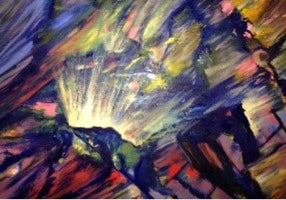
I've been an actor for over 20 years now and I've never worked on a play that has had such a profound impact on its audience before.
"Cracked: New Light on Dementia" has been a very moving experience.
For example, we did two performances at the Ontario Science Centre in January. At first, it had all the hallmarks of being a bit of a dud. It seemed like the wrong venue... bad acoustics, poor attendance, a few folks got up and left mid-performance. We were out there for the first show feeling like "oh well... we're getting paid, let's just do this and get on with our day..." but then the post-show talk back happened...
We do post-show Q&A's after every performance (generally, the most you'll do for an "average" play is one Q&A per week, maybe only one for the entire run of the play). Every single time, without fail, members of our audience are moved to tears and they share their own experiences with dementia and their experiences in dealing with "the system". They tell us how true to life our story is. The OSC's house tech came up to us after the first show and told us that he hadn't experienced a show that had triggered him emotionally the way that "Cracked" had. Those few people who had stuck through that show, stayed afterwards to tell us how powerful it was. No-one commented on the poor attendance or the limitations of the venue.
I can’t overstate what a profound experience this is, even in the context of live theatre (I say “even in the context of…” because so many presume that live performance is chock full of profoundly moving experiences for the artist and audience alike and that is really not always the case. Many times, it’s a job for the artist and a night out for the audience). While Q&A’s are not uncommon in professional theatre; receiving such powerful feedback, time after time, consistently and with such genuine feeling is, in fact, not a common experience for us. More often than not, in a typical Q&A session, the most popular questions are: “how do you memorize all of those lines?” or, “what made you want to become an actor?”. During the run of “Cracked” we received many comments as opposed to questions. After every single performance we heard the words “powerful” and “deeply moving” from multiple audience members. They asked us (actors!) how we thought we could begin to change the issues that we address in the play. Thank goodness there was always a researcher on hand to field those questions! We, the actors, were merely there to tell the story. The researchers are the ones who have done, and continue to do, the heavy lifting.
It's easy to get jaded in the world of professional theatre. And it's pretty amazing to be reminded of the power of story-telling and its ability to help the healing process when you find the right audience. As an artist, I live in a world of scant funding. It’s always a struggle to get work, and to get work seen by an audience. To bear witness to the Herculean efforts of Sherry Dupuis, Pia Kontos, Gail Mitchell and Christine Jonas-Simpson to secure funding for the development of this piece and a limited performance run has been truly inspiring. I’ll say it again: I cannot overstate, as a professional theatre artist, how much this means in terms of recognizing the power of story-telling as a way to facilitate the healing process. It’s something that we, as artists, always hope can exist within our work. We seek it out within the confines of our industry (that being, “The Arts”). To have this opportunity provided to us from an outside source (that being, the world of Academia and researchers) just serves as proof of how Universal a language Art is and can be. We could not have had this experience without these incredible researchers and they needed our help to turn it into something that people could sit back, witness and feel, as opposed to sitting down alone and reading a research paper.
This is one of those shows that I'd do even if there was one person sitting out there. It's the real deal.
Kudos to the research team for choosing theatre as the medium to present their research to a wider audience. And many thanks to Julia Gray for asking me to be a part of it.
While audiences of “Cracked: New Light On Dementia” have had their faith restored that life can be possible, joyful and hopeful with dementia, I have had my faith restored in the power of my craft. For me, this isn’t so much a story about how wonderful theatre is as a medium, though. This is a success story about the power of talking to one another. It's about communicating. It’s about not giving up. And more importantly, it’s about the power of listening.
Thank you for listening. I hope that this story continues to find an audience.
---------------------------------------------------------------------------
To learn more about the making of Cracked view the following video.